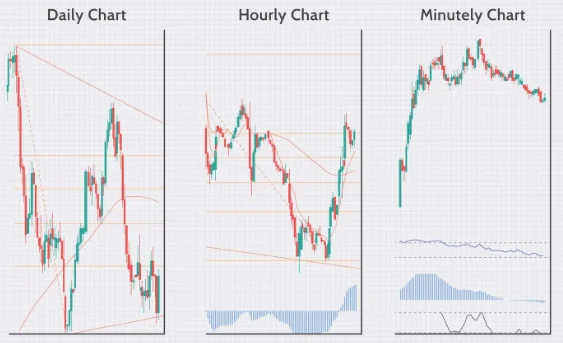
It takes a combination of education, practise, dedication, and ongoing learning to improve your Forex trading abilities. The following actions can assist you in improving your skills as a Forex trader:
Learning and Information:
- Learn the Fundamentals: Get a firm grasp of the currency pairs, exchange rates, and players in the Forex market at the outset.
- Discover prospective trading opportunities by studying chart patterns, indicators, and technical analysis.
- Learn about economic data, central bank policies, and world events that can impact currency prices in order to comprehend fundamental analysis.
- Learn about risk management strategies including as leverage management, stop-loss orders, and position size.
Exercise:
- Demo Trading: To practise trading with virtual money, open a demo account with a forex broker. This lets you experiment with your plans without having to stake actual money.
- Backtesting: Examine past price data to evaluate your trading methods and determine their potential performance in the past.
Create a Trading Strategy:
- Make a thorough trading plan that outlines your objectives, risk tolerance, and entry and exit tactics. Adhere to your plan and refrain from making snap decisions.
Risk Control:
- Utilise appropriate risk management strategies to safeguard your trading funds. This entails establishing take-profit and stop-loss orders and never taking on more risk than you can comfortably lose on a single trade.
Control of Emotions:
- Avert trading on emotion. Control your emotions and avoid acting on impulse or out of greed or fear.
- Observe Your Trading Strategy: Even in the face of market volatility, adhere to your predefined strategy and plans.
Ongoing Education:
- Keep abreast on events and happenings in the market. Currency markets are subject to the effect of economic indicators, geopolitical happenings, and central bank policies.
- Keep an open mind and be willing to modify your tactics when the market demands you to.
Trade with Self-Control:
- When trading, exercise patience and discipline. Steer clear of overtrading and going after fast profits.
Maintain a Trading Diary:
- Keep a record of all of your trades, including the entry and exit points, the trade’s justification, and the outcome. This aids in performance analysis and helps pinpoint areas that require development.
Comments and the Community:
- Communicate with other traders in trading communities, on social media, or in forums. As a trader, you can develop and learn by exchanging ideas and experiences.
Mentoring:
- To get knowledge from seasoned traders who can offer advice and impart their experience, think about finding a mentor or enrolling in a trading course.
Concentrate on a Small Number of Currency Pairs:
- It’s usually preferable for a novice to concentrate on a small number of currency pairs that they fully understand as opposed to trading a large number of pairs.
Accept Setbacks:
- Trading involves some loss-making. Don’t let them demotivate you. Resolve to learn from your mistakes, modify your tactics, and keep becoming better.
Recall that there are no guarantees of profit and that trading forex is inherently risky. It is imperative that you proceed cautiously and only invest money that you can afford to lose. It takes time to build trading abilities, so be patient and keep trying to get better.
FOR MORE INFO CLICK THIS SITE:https://learningsharks.in/
FOLLOW OUR PAGE:https://www.instagram.com/learningsharks/?hl=en
